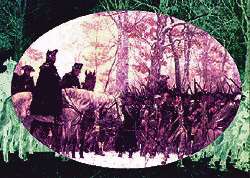Washington Avowed God's Blessing
There has been debate as to whether Washington indeed offered his famous "Prayer of Valley Forge." Apparently there is a lack of the authentication with which the historian seeks to monument his recordings in all the solemnity of established fact. Yet, why, it may be asked, should people of a Christian nation, professing a trust in the Supreme Being, proclaiming that profession even on the minted coin of barter and trade, inscribing it on their secular and legal documents, displaying an allegorical plaque on their Sub-Treasury in New York depicting the actual scene of the prayer -- why, it seems pertinent to inquire, should they discard that faith in one more tradition which places the great and lonely Man of Valley Forge as the centerpiece of an act that indicates a profession of faith in the efficacy of prayer.
Is it not reasonable to believe that a man who had, on frequent occasions, paid homage publicly to the God of all nations and earnestly exhorted his soldiers and his fellow countrymen to "express our grateful acknowledgements to God, for the manifold blessings he has granted to us," may have sought seclusion for his own private communion with the Father. Surely the evidence of Washington's faith is sufficiently established to satisfy a layman, if not an historian.
He called a general thanks to God for December 18, 1777, as provided by Congressional resolution, but more to the point are his words written to the Rev. Israel Evans, Chaplain to Poor's New Hampshire Brigade. Mr. Evans had caused his sermon, as delivered at Gulph Mills the day before the entry into Valley Forge, to be printed by Francis Bailey at Lancaster and one of these imprints reached Washington March 12, 1778. From Headquarters, Valley Forge, the next day, March 13, Washington wrote Mr. Evans as follows:
"Revd. Sir: Your favor of the 17th. Ulto., inclosing the discourse which you delivered on the 18th. of December; the day set a part for a general thanksgiving; to Genl. Poors' Brigade, never came to my hands till yesterday.
"I have read this performance with equal attention and pleasure, and at the same time that I admire, and feel the force of the reasoning which you have displayed through the whole, it is more especially incumbent upon me to thank you for the honorable, but partial mention you have made of my character; and to assure you, that it will ever be the first wish of my heart to aid your pious endeavors to inculcate a due sense of the dependence we ought to place in that all wise and powerful Being on whom alone our success depends; and moreover, to assure you, that with the respect and regard, I am, etc."
Is it too hard to believe a man who sets down in writing the first wish of his heart is "to inculcate a due sense of the dependence we ought to place in that All wise and powerful Being on whom alone our Success depends," may have sought Divine Guidance, through prayer, in the darkest hour of the conflict for human rights.
Above all else at Valley Forge Washington held to his faith, and prayer was an essential of his belief -- whether vocal in the wooded tract, silent in the stable stall, on bended knee at the bedside or in concert with associates at public service. It is well for men's souls to feel that a leader of men sought and obtained guidance from the Son of Man.

